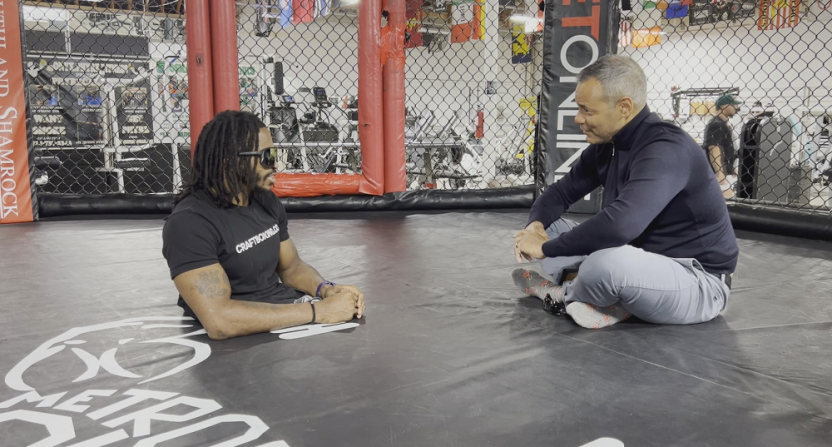HBO’s Real Sports with Bryant Gumbel has spotlighted many inspirational stories of unconventional athletes over the years, but one of the most unconventional they’ve featured yet is MMA fighter Zion Clark. Clark was abandoned at birth after being born without legs due to a rare disorder, and spent much of his early life moving from foster home to foster home. He found a useful outlet in wrestling in high school, and has now spent the past five years training to be a professional MMA fighter. In Real Sports‘ most recent episode (available now to stream on Max), there’s a segment on Clark that’s well worth a look, produced by Katie Melone and featuring correspondent David Scott. Here’s a clip from that:
That clip starts with an early part of the piece, which features Scott reading off some of the comments about Clark to him. “You’ve been called stubborn, cocky, arrogant, crap-talking attitude…and that’s by the people that love you.” Clark laughs and says “That’s great. After some background, Scott then says “MMA is a sport that would seem to rely on two legs,” and Clark replies “Yeah, but here’s the thing. I don’t care how many times I get knocked down, I’m going to keep standing back up. I’m going to keep getting back in your face until I have success.”
After that, the clip has some impressive shots of Clark fighting, and then has him talking about the background that led him there.
“I’ve spent my entire life fighting. Literally, I’ve either been getting my ass beat or abused. So now I can take that power and point it into something productive.”
Later on in the full segment (which can be seen here, with a Max subscription), Clark goes into more detail on that upbringing, including his mother’s drug use. He says “I’m like what you call a literal crack baby.” He then details a series of horror stories from his time in foster care, including how one foster mother threw a chair that hit him in the head and split his nose open. Another home denied him food, and he then lived in a house with plywood windows and no blankets, but said that wasn’t actually too bad compared to others: “I got accustomed to that, because after a while, the homes that they were putting me in were just worse and worse and worse.” He then talks about repeated attempts to commit suicide, beginning as young as 10, and said getting into wrestling saved him.
“Oh, absolutely, wholeheartedly it did. If it wasn’t for wrestling, I probably would have ended up in the streets permanently, and I probably would have died, or overdosed on drugs.”
One of the powerful other interviews in here is with Clark’s high school wrestling coach, Gil Donahue. Donahue says he saw how much wrestling meant to Clark early on. “It was like a place he could go and get a release, a release from all the pressure that he had during the day. …I knew he was going to give me 100 percent every day.”
Another notable interview is with coach Antonio McKee, who worked with Clark on MMA training. He said he couldn’t get his head around Clark’s confidence at first. saying his first thought was “What the **** is this guy’s problem?” McKee goes on to say “He had this cockiness, arrogance, crap-talking. And I’m trying to address this like ‘Wait a minute, what? You don’t have any legs! There ain’t no way you’re going to fight!'”
But Clark certainly has done that, including recording a unanimous win over Eugene Murray in his first pro fight in December at Gladiator Challenge: Seasons Beatings. And Real Sports does well here to explain how fights with Clark work. The one rule concession he receives is that he’s considered a grounded opponent and can’t be kicked in the head. But beyond that, anything goes.
And footage of Clark fighting shows off just how athletic and tenacious he is. So does footage of him at home, where he can jump from the floor to the counter and open cabinets. Clark is a remarkable talent, even being named the “Fastest Man on Two Hands” by the Guinness Book of World Records in 2021. And while he’s received media coverage before, including from ESPN back in 2016, from a Netflix short documentary in 2018, and from The New York Post last year, it’s cool to see Clark get this kind of Real Sports spotlight. And Scott and Melone do an excellent job of getting good insights from Clark, including on why fighting is so important to him.
“Fighting, be as savage as you want. That’s another reason why I do it. I can let loose and let out any type of emotion I’m feeling, as long as it’s controlled. And that makes me a force to be reckoned with. And I am not being cocky when I say this; you get in my way, I’ll move you out of my way, because I got **** to do.”
The Clark segment and the rest of the latest episode of Real Sports with Bryant Gumbel, also covering the grass and turf field debate, stunt performers, and an update on Iranian tennis player turned activist Mansour Bahrami, can be streamed on Max here.






